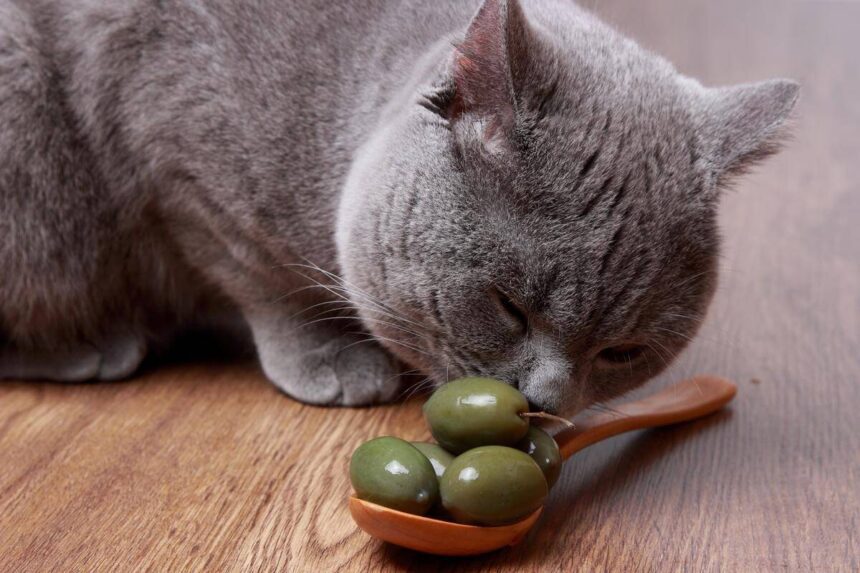So, you’re sitting on the couch, enjoying a lazy afternoon, and your cat is giving you that look. You know the one. The “I see you eating something, and I want it too” stare. You glance down at your plate, and there it is—a shiny, green olive. You pause.
Can cats eat olives? Is it safe? Will your furry friend turn into a tiny olive addict? Let’s dive into this juicy topic and find out.
Why Is My Cat Obsessed with Olives?
Cats are curious creatures, and their fascination with olives isn’t just random. Olives have a strong, pungent smell that can be intriguing to their sensitive noses. Some cats even go nuts for the scent, rubbing against the jar or trying to steal one off your plate.
But here’s the kicker: olives contain a compound called oleuropein, which is similar to a chemical found in catnip. Yep, you heard that right. Olives might just be the new catnip for some felines. So, if your cat is acting all weird around olives, now you know why.
Can Cats Eat Olives? The Short Answer
Alright, let’s cut to the chase. Can cats eat olives? The answer is… kind of. Olives aren’t toxic to cats, but they’re not exactly a superfood for them either. If your cat sneaks a tiny bite of an olive, chances are they’ll be fine. But before you start tossing olives into their food bowl, there are a few things you need to know.
Is It Safe for Cats to Eat Olives?
The short answer is yes, but with caution. Olives aren’t toxic to cats, but they’re not exactly a health food for them either. The biggest concerns are the high sodium content (thanks to the brine) and the pits, which can be a choking hazard or cause intestinal blockages. If you’re going to let your cat try an olive, make sure it’s plain, pitted, and cut into small pieces. And keep it as an occasional treat—not a regular snack.
Benefits of Olive Oil for Cats
While olives themselves are a so-so snack for cats, olive oil can actually have some benefits:
- Improves Digestion: A small amount can help with constipation.
- Boosts Skin and Coat Health: The healthy fats in olive oil can make your cat’s fur shinier.
- Adds Flavor: A drizzle can make dry food more appealing for picky eaters.
Just remember: moderation is key. Too much olive oil can lead to weight gain or digestive issues.
The Good, the Bad, and the Salty
Let’s break it down.
The Good
Non-Toxic: Olives aren’t poisonous to cats. So, if your cat manages to snag one, don’t panic.
Fun Snack: Some cats genuinely enjoy the taste or smell of olives. It can be a fun, occasional treat.
Low Calorie: Olives are relatively low in calories, so they won’t pack on the pounds if given in moderation.
The Bad
High in Sodium: Olives are usually packed in brine, which is basically saltwater. Too much salt can be harmful to cats, leading to dehydration or even sodium ion poisoning.
Pits Are a No-Go: Olive pits are a choking hazard and can cause intestinal blockages. Always remove the pit before even thinking about giving an olive to your cat.
Additives and Preservatives: Store-bought olives often contain additives like garlic or onion, which are toxic to cats. Even a small amount can be dangerous.
The Ugly
Digestive Issues: Cats are obligate carnivores, meaning their bodies are designed to process meat, not plant-based foods. Olives might upset their stomach or cause diarrhea if eaten in large quantities.
How to Safely Share Olives with Your Cat
If you’re determined to let your cat try an olive, here’s how to do it without turning it into a vet visit.
Choose Plain Olives: Skip the fancy flavored ones. Go for plain, unsalted olives without any added spices or preservatives.
Remove the Pit: This is non-negotiable. No pit, no problem.
Cut It Up: Slice the olive into tiny, bite-sized pieces to make it easier for your cat to eat.
Moderation Is Key: Treat olives like a rare delicacy, not a daily snack. A small piece once in a while is plenty.
What If My Cat Eats Too Many Olives?
Okay, so your cat went full olive heist and ate way more than they should have. What now?
First, don’t freak out. Keep an eye on them for any signs of trouble, like vomiting, diarrhea, or excessive thirst. If you notice anything unusual, call your vet ASAP. Better safe than sorry, right?
Why Is My Cat Obsessed with Olives?
Here’s where it gets interesting. Olives contain a compound called oleuropein, which is chemically similar to nepetalactone, the active ingredient in catnip. For some cats, this means olives can trigger a similar reaction—rolling, rubbing, and general goofiness. If your cat is obsessed with olives, it’s likely because they’re responding to that unique scent. It’s like catnip in food form!
Are Olives Toxic to Pets?
For cats, olives aren’t toxic, but they’re not ideal either. However, other pets might not be so lucky. For example, olives often come packed with garlic or onions, which are toxic to both cats and dogs. Always check the ingredients before sharing any human food with your pets.
Do Cats Like Green or Black Olives?
It depends on the cat! Some cats prefer the milder taste of green olives, while others might go for the richer flavor of black olives. The color doesn’t make much of a difference in terms of safety—just make sure they’re plain and free of additives.
Can Cats Eat Olives with Pimentos?
Nope. Olives stuffed with pimentos often contain spices, preservatives, or even garlic, which can be harmful to cats. Stick to plain olives if you’re going to share.
Can Cats Eat Black Olives?
Yes, but the same rules apply. Black olives are safe in small amounts as long as they’re plain, pitted, and low in sodium.
Can Cats Eat Olive Oil?
Surprisingly, olive oil can be beneficial for cats in small amounts. It can help with digestion and even add a little shine to their coat. Just don’t overdo it—a teaspoon mixed into their food occasionally is plenty.
Do Olives Get Cats High?
Kind of! As mentioned earlier, the compound in olives (oleuropein) can mimic the effects of catnip for some cats. If your cat is rolling around or acting extra playful after sniffing or eating an olive, this is why.
Can Cats Eat Green Olives?
Yes, green olives are safe for cats as long as they’re plain and pitted. Just remember to keep it minimal—olives should never replace their regular diet.
Can Dogs Eat Olives?
Dogs can eat olives in moderation, but the same precautions apply. Avoid olives with pits, high sodium, or added ingredients like garlic. Always consult your vet if you’re unsure.
Can Cats Eat Kalamata Olives?
Kalamata olives are a bit trickier. They’re often marinated with vinegar, herbs, or spices, which can upset your cat’s stomach. It’s best to avoid them and stick to plain varieties.
Olive Alternatives: Safer Snacks for Your Cat
If you’re looking for a safer way to treat your cat, there are plenty of options that won’t leave you worrying.
- Cooked Meat: Chicken, turkey, or beef (without seasoning) is always a hit.
- Catnip: It’s like olives, but without the salt.
- Commercial Cat Treats: Specifically designed for feline nutrition, these are a no-brainer.
The Verdict: Should Cats Eat Olives?
So, can cats eat olives? The answer is a cautious yes, but with a lot of asterisks. Olives aren’t toxic, but they’re not exactly healthy for your cat either. If your feline friend is obsessed with olives, it’s okay to let them have a tiny piece every now and then—just make sure it’s plain, pitted, and given in moderation.
At the end of the day, your cat’s health comes first. If you’re ever unsure about a food, it’s always best to consult your vet. After all, you want your kitty to live a long, happy, and olive-filled life (within reason, of course).
TL;DR: Can cats eat olives? Yes, but only in moderation, plain, and without the pit. Keep it safe, keep it simple, and always prioritize your cat’s health. Now go enjoy those olives—just maybe hide the jar from your furry food thief.



